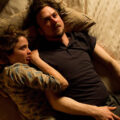Documentary filmmakers will have a strong presence at the Hof International Film Festival in this anniversary year. Beyond the topics of globalization, the filmmakers take a look at private subjects and focus, be it directly or indirectly, on the questions of our times: Migration and immigration or life on the margins of society. Some filmmakers explore the chasms of our society while others embark on journeys into the desert or other cultures. It is also quite remarkable how many artist and musician portraits will be presented at the festival.
In A STORY OF SAHEL SOUNDS, Florian Kläger, Markus Milcke and Tobias Adam of neopan kollektiv accompany the blogger Christopher Kirkley and his project “Sahel Sound” to Niger. The project operates as a blog, label and platform to convey art and music beyond the well-trodden path of the mainstream. Thorsten Schütte’s EAT THAT QUESTION – FRANK ZAPPA IN HIS OWN WORDS is dedicated to the rock legend and genius himself. Zappa’s daughter Moon will personally present the film in Hof. WE ARE X by Stephen Kijak portrays Japan’s successful rock band X, who are barely known in the West. In ZYKLOP, Aysun Bademsoy accompanies Marc Sinan to Kazakhstan, where he visits musicians and records their ballads and songs. The journey becomes a very personal encounter with Armenian history and a stirring musical theater about guilt and punishment. Music plays an entirely different role for Wolfgang Ettlich: For five young guys from the Berlin Neukölln district during the post-war Economic Miracle in Germany the decisive question was: BIST DU BEATLES ODER STONES.
Angela Christlieb accompanies the artist and galerist Salvatore Viviano in WHATEVER HAPPENED TO GELITIN on his quest for the members of the Austrian artists group Gelitin. This fictive research forms the narrative frame for the film which points out the anarchistic activities of the group. Corinna Belz portraits the famous writer in her film PETER HANDKE - IN THE WOODS, MIGHT BE LATE. A quarter of a century ago, the staging of the musical “Phantom of the Opera” at the Floria-Theater in Hamburg was hindered by left-wing activists and local residents. 25 years later, the artist Christoph Faulhaber stages the musical anew in PHANTOM OF PUNK – MACHT UND FREIHEIT right in front of the Flora-Theater. And Douglas Gordon traces not only the life story of the avant-garde artist Jonas Mekas in I HAD NOWHERE TO GO, the film is also exemplary for the numerous experiences of expatriates, refugees and immigrants in the 20th century.
In BORDERLAND BLUES by Gudrun Gruber, the desert dwellers on the geographic border of the USA in Arizona tell of their lives among migratory flows and the ever-increasing and highly technical border control measures in the area. The Austrian filmmaker Michael Pfeiffenberger also took off into the desert. In DESERT KIDS he concentrates on the cohabitation of children and youth in the Israeli Negev Desert, where there are many Jewish and Arabic communities. Completely different, however, is SAFARI by Ulrich Seidl: an unsparing demonstration of big game hunting and hunting tourism in Africa. Seng Mai Kinraw’s journey in TO BE WITH YOU – MY FAMILY IN MYANMAR casts not only an intimate look at her family, but also offers insight into the soul of the country caught up between dictatorship and the will to modernize. James Stier takes us to Cornwall in Great Britain in his film LAST FISHERMAN.
Thomas Riedelsheimer embarks on a journey in DIE FARBE DER SEHNSUCHT through five countries and encounters people of all different origins and social backgrounds. But they are all connected by the longing for a sense of home, recognition and freedom. Just like the protagonists in Vivien Hartmann’s film SPREE HOTEL, who live in a hotel in Bautzen that was turned into refugee housing. As a microcosmos, with all of its good and bad characteristics, the hotel reminds us of a lively village. Antje Starost and Hans Helmut Grotjahn portray the resistance fighter Freya von Moltke in GESCHICHTE EINER LIEBE – FREYA and recount her first encounter with her later husband Helmuth James von Moltke and the activities of the Kreisau Circle. An exchange of letters substantiates the great love of the two, which didn’t end when von Moltke was executed in 1945.
Insight into the lives of future athletes is provided in Anna Koch’s SCHULTERSIEG: the girls train hard as wrestlers and go through the ups and down of training at a sports academy in Frankfurt/Oder. In THE KILLING$ OF TONY BLAIR, Sanne van den Bergh, Daniel Turi and Greg Ward portray the former British Prime Minister and point out just how strongly his political actions were influenced by his personal vested interests. Daniel Schweizer shows in his film TRADING PARADISE the third part of a trilogy about Swiss society and a commodities giant with its headquarters in Zug and Geneva and the fight for transparency in world trade. Arne Strackholder’s WAFFEN is about weapons. He presents the handling of weapons in children’s games, in sports or in the imitation of American elite soldiers and poses the question: which experiences are made while playing which are in fact brutal reality in other places.

